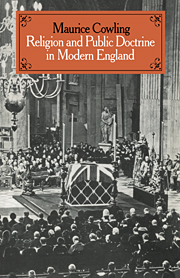Summary
‘The religious bearing of the theistic philosophies of thinkers such as James Ward and W. R. Sorley was obvious, and though it may be fairly questioned how far the philosophies of Bradley and Bosanquet or their disciple Mr Oakeshott succeed in doing justice to the demands of the religious consciousness, no one can mistake their high valuation of the religious side of life and their determination to make room for it in their thought.’
J. M. Creed The Divinity of Jesus Christ 1938 (1964 edition) p. 18.‘Christianity is a religion, and while it is not a characteristic of religion to remain unchanged throughout human history, it is one of its characteristics continually both to conform to and to lead what may be called the civilization or culture of its adherents.’
M. Oakeshott The Importance of the Historical Element in Christianity in The Modern Churchman 1928–29 p. 364.‘A religion is what I have called a practice; it is a consideration in self-enactment. A man may enact himself religiously, but there are no religious actions. Every religion, each with its own image of deity and of self, has its own idiom of faith which reflects the civilization of the believer. It may be terrible, it may sink to the prose of a merely anticipated release … or it may rise to a serene acquiescence in mortality and a graceful acceptance of the rerum mortalia. … […]
- Type
- Chapter
- Information
- Religion and Public Doctrine in Modern England , pp. 251 - 282Publisher: Cambridge University PressPrint publication year: 1980



